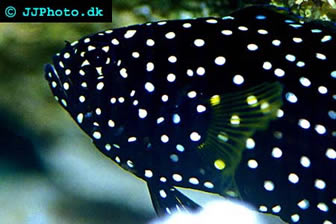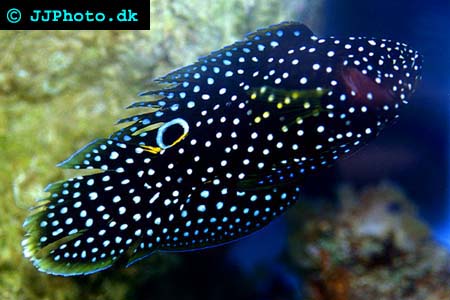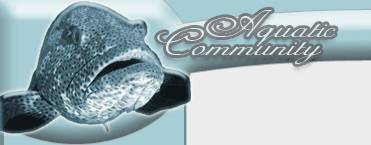Marine Betta

Scientific name: Calloplesiops altivelis
The Marine Betta is a stunningly beautiful fish that unfortunately requires a lot of care to do well in aquariums since they can be very hard to get to eat. They often refuse to eat anything but live food and can be very slow eaters making it hard to feed them in aquariums with other faster eaters.
Marine Betta fish are predators with a very interesting hunting technique. They approach there pray swimming sideways and waiting for the prey to try to escape and when the prey try to escape on the side of the fish they have a 50/50 to escape towards the fish mouth. This behaviour is also believed to be a protection strategy since it is believed that the Marine Betta mimics morays with their spots and by swimming sideways.
Marine Betta fish (Calloplesiops altivelis) is a member of the grouper group and are found in the Indo-Pacific ocean. They are widely available in the aquarium trade and smaller specimens are usually a better purchase since they more easily adapts to new environments. They can grow to be 27 cm / 11 inches in aquariums even if most specimens never reach anywhere near this length and 16 cm / 6 inches is a more common size for an adult Marine Betta. They are a hardy species if their feeding habits are meet and only seldom suffers from diseases.
If you plan to keep Marine Betta fish you must first make sure that you have a suitable aquarium environment to host them. An aquarium meant to host Marine Betta fish should contain a lot of caves and stone formations among which the fish can hide and stalk their prey. They are primarily active during the nights and prefer dimmed lighting. If you plan to keep Marine Betta Fish in a reef aquarium you should make sure to create some dark corners since Marine Betta fish doesn’t like the bright like that is used in reef aquariums. They are also not very good swimmers which mean that there has to be calm areas without much water movement if kept in a reef aquarium with fast moving water. Fish of this species become extremely shy if not provided with enough hiding places and will display a relatively shy behaviour even if provided with a large amount of caves.
Marine Betta fish spend most of their time in caves and can be kept in relatively small aquariums. An aquarium tank of 200 L / 55 gallon is enough to keep a pair of this species. They are predators and should as such not be kept with fish that are small enough to be considered food. They can usually be kept with not to small invertebrates. Marine Betta fish can if they are kept well feed usually be kept with smaller fish without touching them. However you should be aware of the risk that the smaller fish gets eaten if you try this. (try at you own risk) Marine Betta fish should never be kept with fast eating fish like damsels.

Marine Betta – Calloplesiops altivelis. Copyright www.jjphoto.dk
Marine Betta fish can as earlier mentioned be hard to get to eat and only occasionally accepts dead food such as frozen food, mussel, shrimps and fish fillets. They are best feed live fish or live black worms. Black worms are often an appreciated food and can be a good choice to use when trying to teach these fish to learn to eat frozen food. It is important to give them a varied diet. Their shy nature and slow feeding habits means that you will have to take speciall care to make sure that they get enough food.
It is possible to breed Marine Betta fish in aquariums and aquarium breed fish are available in the aquarium trade from time to time. Tank breed fish are often of better quality and is often a better buy even if they are smaller then wild caught. It is hard to sex this species. They lay up to 500 eggs on the roof of a cave and the eggs hatch after 5 days. The fry only has a very small yolk sac and will start to eat almost instantaneously after being hatched. Marine Betta fry grows slowly and needs 7 months to adapt the adult coloration. Marine Betta fish has a relatively rough spawning act that often result in damaged finage on the parents.
Marine Betta fish are often seen as fish that is hard to keep but the truth is that this beautiful fish is relatively hardy and easy to keep if you just consider there eating behaviour and care for them accordingly.
Related Articles
Black Dogface Puffer - Information about Black Dogface Puffer
Bowfin fish - An introduction to living fossils know as Bowfin fish
Boxfish- Information about Boxfish
Crocodile needlefish - An introduction to Crocodile needlefish
Dogface puffer - Information about Dogface puffer
Hogfish - Information about Hogfish
Lionfish - An introduction to lionfish.
Mandarin Goby - An Introduction to the Mandarin goby
Moray eels- An article about how to keep moray eels in aquariums.
Nudibranch - An introduction to Nudibranchs
Octopus aquarium - How to keep and perhaps even breed Octupus in an aquarium.
Pipefish - An introduction to pipefish
Saltwater aquarium fish - An introduction to marine aquarium. fish for beginners.
Sea horses in Aquarium - An article about how to keep sea horses in aquariums.
Sea star facts - Intersting and fun acts about sea stars such as the fact that they are in no way related to fish.
Sea Stars - An introduction to Sea Stars.
Clownfish Articles:
Black Clownfish - Information about Black clown fish
Breeding Clownfish - A very brief describtion on how to breed clownfish
Percula Clownfish - An article about how to keep and breed Percula breeding.
Tomato Clownfish - An in deepth article about tomato clownfish
Anthias
Aquarium Chillers
Basses
Batfish
Blennies
Butterflyfish
Cardinalfish
Clown fish
Corals
Damselfish
Files
Goatfish
Gobies
Gorgonians
Grammas
Groupers
Grunts
Hawkfish
Jawfish
Jellyfish
Lionfish
Dragonets
Mantis shrimp
Marine angelfish
Marine Catfish
Moray eels
Nudibranch
Octopus
Pipefish
Protein skimmers
Pufferfish
Rabbitfish
Rays
Snappers
Scorpionfish
Sea Anemones
Sea horses
Sea Stars
Shark Fish
Shrimps
Snails
Squirellfish
Surgeonfish
Triggerfish
Wrasses
